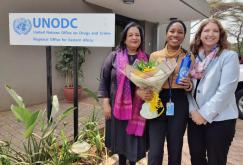About 49.6 million individuals are currently trapped in modern slavery, with one in four victims being children, according to a 2022 report published by the International Labor Organization. This crime is so prevalent that it is happening right now and in every country around the world. It has grown exponentially to become the second-largest black market after the illicit drug trade.
Ending human trafficking is, therefore, no small feat. It requires a coordinated effort from international organizations, member states, NGOs, and survivors who have turned their trauma into advocacy. UN volunteers have also become an integral part of the parties joining to fight and prevent this crime.
Among these volunteers is Akola Munyiri, who served as a Project Support Associate at the United Nations Office on Drugs and Crime (UNODC) Regional Office for Eastern Africa (ROEA) in Nairobi, Kenya. Today, Akola’s experience provides us with an insider's look at the vital work that volunteers do to fight against trafficking.
As a law student, Akola spent her free time volunteering at women's shelters, where she broke down complex legal jargon for women who were facing domestic abuse. She later started working in a law firm before she came across the opportunity to work as a UN volunteer.
I was inspired by the various past and ongoing programmes and projects implemented by UNODC ROEA, specifically on human trafficking and terrorism prevention," Akola explains. "In particular, I was interested in the role that international legal frameworks and UN conventions play in supporting countries to strengthen criminal justice responses and combat these crimes.
At UNODC, Akola found herself at the heart of a U.S.-funded project aimed at enhancing victim-centered approaches to trafficking in persons (TIP) across 13 Eastern African countries.
One of her most memorable projects was a week-long workshop in August 2024, organized in collaboration with experts from the International Criminal Court(ICC), focused on developing Witness Protection Guidelines in Seychelles. This groundbreaking event brought together prosecutors, police officers, immigration officials, and social workers to create a platform for discussions on witness protection and criminal justice responses to TIP in the country.
This was just one of the notable highlights of Akola's busy schedule. Her days were packed with coordinating events such as the launch of an anti-trafficking action plan in Comoros and organizing Kenya's World Day Against Trafficking in Persons.
Behind the scenes, she created talking points for high-level meetings, prepared presentations that broke down complex legal concepts, and wrote reports that showed donors the impact of their support.
As her volunteer period drew to a close, Akola's expertise was sought for two groundbreaking initiatives launched in mid-2024. She contributed to "Empowering Every Badge," a project focused on advancing the role of women in law enforcement in Eastern Africa, and supported efforts to modernize Kenya's National Police Service College Main Campus in Kiganjo.
For these new initiatives, she helped lay the necessary groundwork by preparing detailed Terms of Reference for various services, from accommodation and catering to interpretation services and expert consultants.
Now that her volunteer journey has ended, she’s preparing to pursue a Master's degree in International Human Rights Law at Cambridge University. She has come to understand that while good laws are essential, they're just the beginning. Countries need the right tools, expertise, and inter-agency cooperation to fight crime and trafficking.
To those considering becoming UN volunteers, Akola advises that you “make sure you make the most of it, ask questions, volunteer for tasks outside your comfort zone, and don't be scared to make mistakes. That's the only way you'll learn and grow."
Close to 50 million people are victims of modern slavery, and it takes volunteers like Akola working behind the scenes to support the formation of laws and policies that will eventually reduce and prevent such crimes.

